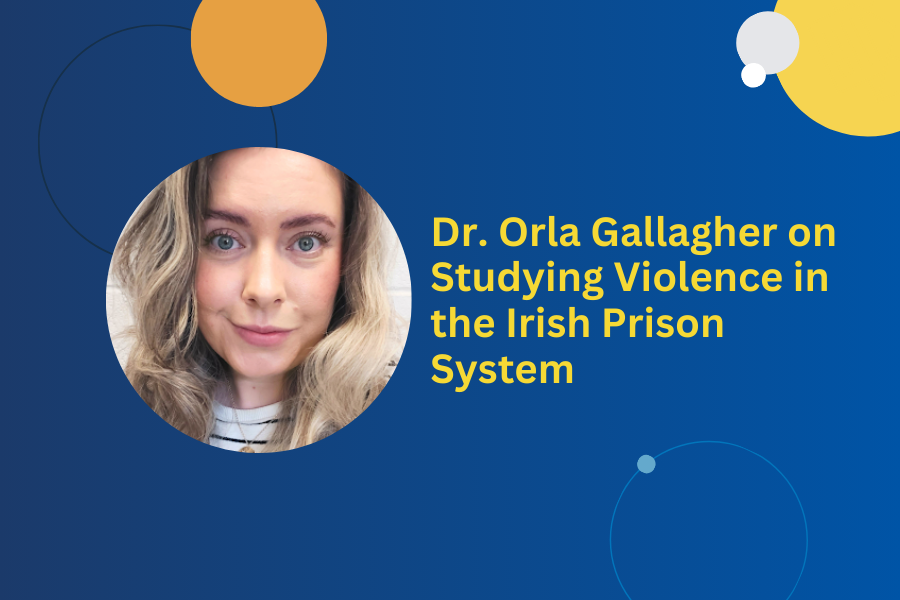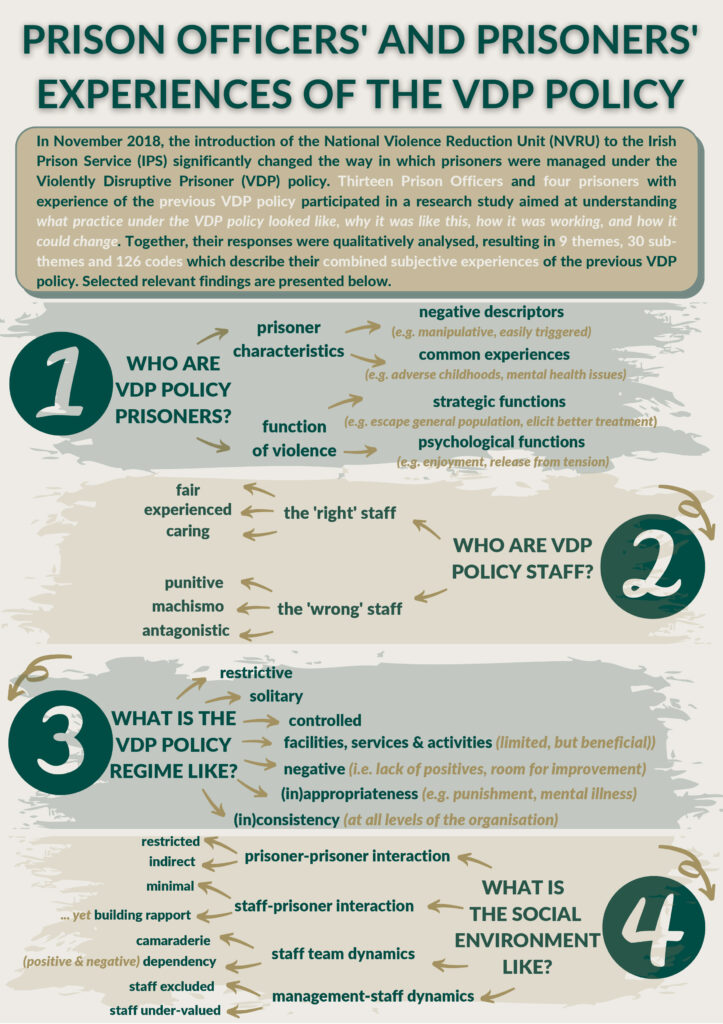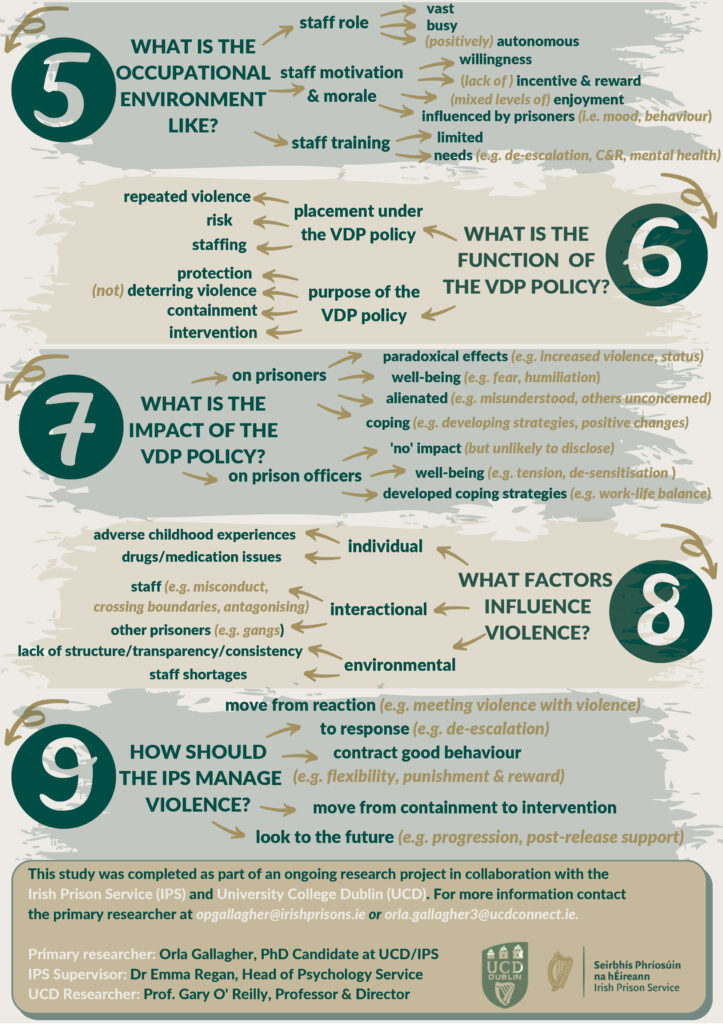
Dr Orla Gallagher is a Post-Doctoral Researcher employed in the Irish Prison Service. Her primary project explores the implementation of an Expert by Experience role in the Irish Prison Service (IPS). She is also completing a small-scale project in conjunction with Senator Lynn Ruane exploring how neurodiversity is responded to in the IPS and sits on the national Homelessness in the Criminal Justice System Research Steering Group. She completed her PhD (in conjunction with the IPS and University College Dublin) in 2023, with her research focused on the management of serious violence and disruption in Irish Prisons. Prior to this she completed her MSc in Clinical Forensic Psychology at King’s College London, and her BA in Psychology and Sociology at the University of Limerick.
This interview was conducted by Cherie Townsend, Executive Director of IACFP, and has been edited and condensed for clarity.
IACFP:
As we begin this interview, will you provide a brief overview of your professional credentials, your education, and your experience? It'd be helpful for our readers to know that.
Dr. Orla Gallagher:
I did my undergraduate degree – a Bachelor of Arts in Psychology and Sociology – at the University of Limerick in Ireland. That was a four-year degree, and it also had a placement built into it. That was quite unusual for an undergraduate psychology degree. It was a six-month placement, and I did three months in a community mental health service for older adults and then three months in an acquired brain injury service. What was quite unusual with that program was that the placement was mandatory, and it was also mandatory to spend a semester studying abroad. I actually studied at McMaster University in Canada for a semester, which I loved. I absolutely loved it there. That was actually my first time getting to do a module in forensic psychology. Because it wasn't really something that was part of the degree picture over here, it was really exciting.
I really enjoyed forensic psychology. As soon as my undergraduate was done, I went straight into my master's in clinical forensic psychology at King's College in London. I moved around for all the different courses. The one at King’s College was really clinically focused and very applied. It also had a placement built in throughout the entire year. I was an assistant psychologist in a low-secure forensic mental health hospital during that time. And then I went straight again from the master's into the PhD in psychology with the University College Dublin back in Ireland, supervised by Professor Gary O'Reilly, the director of the program in clinical psychology. The Irish Prison Service (IPS) side of it was supervised by Dr. Emma Regan, and it was also funded by the Prison Service as a four-year PhD package.
IACFP:
Were you one of the first people to go through that kind of prison-funded program?
Gallagher:
Yes. It was very much uncharted territory and kind of learning as we went. But what's been great to see is that in the time since I started the PhD and where I am now, research has grown and grown, which is what I love to see. Shortly after I started the PhD, they brought in another PhD student. She's just finishing up at the moment. Her research is on life-sentence prisoners. We now have three research assistants working on three different research projects as well. So it's slowly growing for a very small service.
IACFP:
What was the focus of your PhD research? What motivated you both to pursue a PhD and to focus particularly on that topic?
Gallagher:
There were two main foci. The first was the Violently Disruptive Prisoner (VDP) policy, which was the policy under which prisoners who were repetitively and seriously violent in prison were managed, and how that was changing at the time that I did the research. And then the second focus was the Power Threat Meaning Framework – which came out around the same time as I was doing the research – and seeing how we could apply it. We wanted to see if we could use that to explore our understanding of violence. In terms of motivation for doing a PhD, I didn't really have one at the start. I always joke that I kind of fell into it, but it's not the kind of thing that you fall into.
As I was finishing up my master's in London, I felt that... I always really enjoyed the research components of the previous degrees, and because I'd been doing the AP post during the master's, I'd gotten quite good clinical experience. I said, “okay, let's try research and see which I prefer.” So I was kind of looking for a research assistant post, not a PhD, but at the time I was looking this PhD project, funded by the Prison Service, was being advertised. It was a competitive process. Though I wasn't necessarily looking to commit to a PhD at the time, I just thought it'd be foolish not to go for it. At the time, there were very few forensic psychology opportunities in Ireland. It's not like that anymore, thankfully. I just put my name in the hat and it progressed and then I ended up doing it.
Though I sort of fell into it, I’m really glad that I did. Because it was a post that was set up by the Prison Service and UCD, I didn't necessarily choose the topic like other PhD students might have. It wasn't the traditional way that you might go about doing a PhD, but I definitely thought that the topic [violence in prison] was interesting. I liked that it was applied research. I didn't want to do a PhD at a desk in a university.


IACFP:
Can you tell us more about the research that you're doing now?
Gallagher:
The research I'm doing now is very different to my PhD research. My PhD research was all about serious violence in prison. For my research now, my main project is working with the Prison Service to explore how we could implement an expert by experience peer support role. In the psychology service we employ some former prisoners who have done really good work and have progressed along their recovery journeys. They are involved in several roles, such as co-facilitating some groups alongside psychologists, providing input at the strategy policy level in terms of our resources, and presenting different things with us.
We've been doing it on an ad hoc basis. It's now about formalizing what a job description would look like, what a salary scale would look like, what training would look like. What are the kinds of barriers that we might need to overcome to implement it properly in the organization? That's the main project.
IACFP:
Is your role in the Prison Service now as a researcher or as a psychologist?
Gallagher:
Researcher. I'm not clinically trained, so I'm not a clinical psychologist. My role title at the moment is post-doctoral researcher.
IACFP:
How do you see your applied research helping to bridge the gap between research and practice? You’ve done some very specific things regarding staff; can you tell us about that?
Gallagher:
The way it was set up, it was going to be applied research from the very start, which helped the working relationship between UCD and IPS – between academia and practice. That was great. Something that was really interesting for me as a researcher was that they brought me into the project at a time when they were actively changing the way they were managing violence. When I joined, I got to see the NVRU [National Violence Reduction Unit], which became the end point of the research, literally being built from the ground up. I was in those meetings seeing it set up, so I really got a good sense of it. I was given a very genuine before-and-after scenario, which doesn't happen a lot in research. That was particularly interesting.
In terms of how the research influenced practice, I always made sure I had concrete findings to share, because even though it's a funded PhD and it's a really close working relationship with IPS, you have to have some kind of objectivity and boundaries. When I felt I had concrete findings or a paper published that I could share, I always made sure that I had a solid applied dissemination plan. It was great that it was published and in my thesis and at conferences, but internally within the organization, for every kind of paper or study that I wrote up, I made sure that I translated all those findings into something that they could use in practice.
The applied dissemination plan included things like infographics. There were versions for staff and versions for prisoners made readily available. I gave input to the staff working in the NVRU. Recently I was down there to give one kind of final overview of everything, and I made sure to tailor those presentations. For example, prison officers don't want to hear about the theory of the Power Threat Meaning Framework or anything like that. They want to hear what's actually going to be useful to them in their day-to-day roles. "This is what you should be mindful of in your interactions with prisoners in terms of violence," and things like that.
IACFP:
A lot of building that research-practice bridge has to do with communication and dissemination and the way in which those things are done. I think you've really hit on a key point there.
Gallagher:
Absolutely. I think that consistency with both prisoners and prison officers is important as well. Research takes a long time, and with the culture of prisons, sometimes, prison officers might think that they take part in an interview and then you forget all about them. I made sure that when I had results ready to share, I sent them to the original participants and left it open for feedback and discussion. Towards the end, they were kind of like, "God, are you still here? Was this research not six years ago?" And I'm like, "I know, but I want to make sure that you get the end product of absolutely everything, because this is your experience that I've written up." I think the way that you communicate and the consistency, start to finish, has been really, really important.
IACFP:
As these changes were made in how violence was managed in the prison, have you seen outcomes in terms of the reduction of violence interactions, or more productive interactions?
Gallagher:
Yes; from start to finish, there's definitely a change. I'm quite cautious about measuring violence in terms of reduction because I think this is such a complex cohort. I obviously used qualitative research as well. It’s important to think of how you measure success. To me, success is someone making eye contact with me in the clinic room today instead of not doing that. It's not all about the incidents and the statistics. There is definitely a clear change from what we were doing at the start of my PhD to what we're doing now.
IACFP:
What do you see as the highest priorities for correctional psychology and rehabilitation?
Gallagher:
I was thinking a lot about this, and I'm probably a bit biased towards my PhD research but having delved really deeply into the Power Threat Meaning Framework, I really think that we need to progress towards more holistic, genuinely multidisciplinary person-centered approaches. If I look back to the PhD, we were looking at violence and it was just so clear, as the research progressed, that we couldn't just look at violence in isolation. It was related to so many other threat responses that each individual was using to survive. It had so many different functions, it was saying so many things, and the underlying source of all of these threat responses was the negative operation of power.
That kind of approach really places the person at the center as well. That holistic way of thinking about violence and other things, such as substance use and mental health – I would love to see them all being considered in terms of the person who's in front of you. It should be really holistic, which is, I know, easier said than done. More recently, because of my work with experts by experience, I think having lived-experience voices at the table and integrated into our day-to-day practice is really, really important.
IACFP:
I've heard two of the individuals who are experts by experience from your service speak at a conference. What they have to say is so powerful in the way they share their expertise and how their lives have evolved; where they are now compared to where they were is a really dramatic change. We know that we can be so much more effective through the stories we tell. We can share information in a way that better helps people. I understand that when we give stories and examples, there are great benefits, although it's clear that there are downsides as well.
Gallagher:
This is the thing that I'm finding. I've heard so many of these stories as well, and every time, I end up in tears. They're so powerful, they're so meaningful. But then there is a kind of toll to telling your story over and over and over. I suppose what I'd like to see with my work being formalized is that the lived-experience story is always the lens through which experts by experience are going to do their work, but that telling and retelling their story should not be their only role. Their role should be using that lens with all the other transferable skills and expertise that they have.
I think education and training is an important part of that, as well as having really strong boundaries on the role and strong supervision. When someone is an expert by experience, there's a level of authenticity and credibility and a different understanding of the world. There's a nuance to it.
IACFP:
One of the challenges I've seen when I've interacted with people who are experts by experience is that they've developed all of these skills, and it's almost like we don't recognize those skills and allow them to continue to grow.
Gallagher:
Oh, absolutely. I think my goal for the expert by experience role going forward would be that no one should be an expert by experience forever. It should be a stepping stone. We should build you up. We should educate you and train you and develop those skills and open doors for you, whether that's in the Irish Prison Service, in a different role, or in a different organization.
IACFP:
I look forward to seeing what you find out and where you go with that. As a psychologist, what are some of the greatest challenges, do you think, in correctional rehabilitation and psychology?
Gallagher:
I think in the Irish context, our biggest challenge at the moment is the overcrowding that we're experiencing. This might also be the case in other jurisdictions. That's really challenging. I can imagine the toll that could take on clinical work. I suppose when you're in a situation like that the kind of in-depth psychology might be challenging while you deal with the numbers and the basic human needs of people.
IACFP:
Given that you've now been awarded a PhD, what is your next step professionally?
Gallagher:
Well, I'm still in the Prison Service, which is great. I still have a job. The post-doctoral research role is a one-year contract. So I would love to continue in the Prison Service. I've seen the research grow so much in the time that I've been there, and I'd really love not just to be there for it, but to play an active role in progressing it further. I'd love to see evidence-based practice and policy become more embedded in day-to-day operations. I have no plans to go anywhere away from the Prison Service anytime soon.

